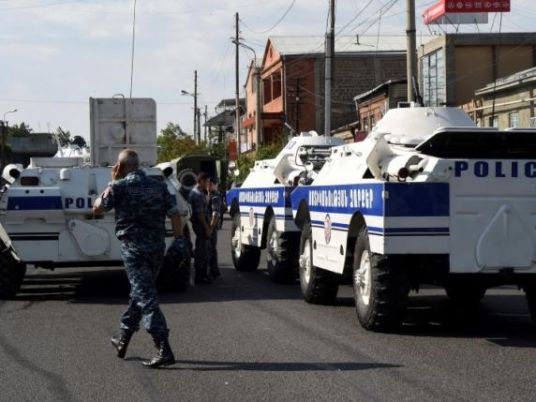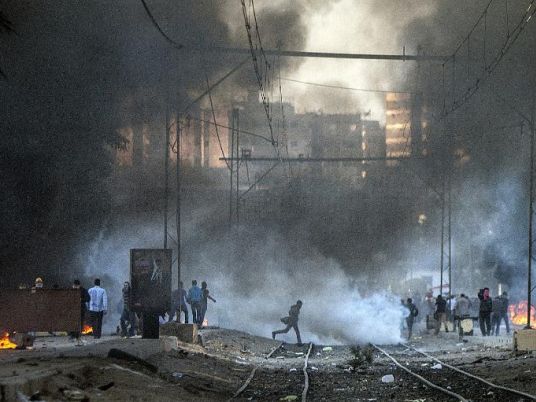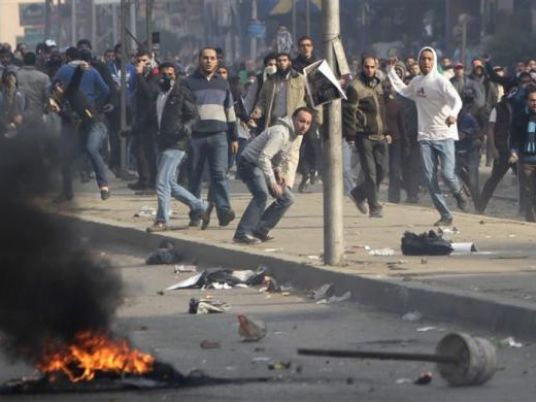
An Alexandrian misdemeanors court sent shockwaves through Egypt on Wednesday when it sentenced 21 young girls, aged 15 to 22, to serve 11 years in prison for holding a peaceful protest supporting the ousted Islamist president Mohamed Morsy on the Corniche in the coastal city.
Seven of the girls were minors, aged 15 to 17, and were sentenced to a juvenile center, says Hamdy Khalaf, part of the defense panel.
The court convicted the girls, most of them university students, on charges of illegal assembly, blocking roads, destroying public property and possessing weapons.
The defendants are part of the pro-Morsy 7am Movement, a peaceful protest group formed in Alexandria in October. The movement aims to protest early at 7am and form a human chain on the Corniche of Alexandria while raising banners and balloons and flashing the four-finger symbol that commemorates the killing of protesters in Rabaa el-Adaweya.
Khalaf, a lawyer at the Egyptian Initiative for Personal Rights, described the verdict as “unprecedented in its harshness and absolutely unfair against peaceful protests,” affirming that these were random arrests. Among those detained was a passerby who he says screamed during the security’s violent dispersal of the protest, and was herded in with the other girls and arrested by mistake.
Khalaf said that an eye witness told the judge that he saw 400 girls crossing the street and as a result the traffic was blocked for 10 minutes. “Yet, the judge did not take his witness into consideration and pronounced his tough sentence for blocking road as one of charges,” Khalaf said.
The human rights lawyer said he will appeal the verdict on legal grounds that they should be punished for only one charge that the law considers the most dangerous one, rather than slamming them with several penalties.
The same Alexandria court also sentenced six members of Morsy’s Muslim Brotherhood to 15 years in prison in absentia for inciting the protest.
The verdict comes as the interim government tries to make an example, showing the fate of protesters who continue to demonstrate despite the new law enacted on Sunday that clamps down on freedom of assembly.
The sentence has, however, stirred public opinion against the current government and the judiciary and is provoking a fresh wave of protests from both Islamists and liberal sympathizers venting their rage against the oppressive tactics of the new interim government.
Since the passing of the protest law, it seems for the first time both Islamist and secular forces are protesting simultaneously, though separately, against a regime that critics accuse of deviating from the goals of the 25 January and the 30 June revolutions.
Solidarity protests held outside Alexandria’s Mansheya district court on Wednesday were dispersed by security forces who used tear gas and chased protesters down the Corniche away from the court, Khalaf said.
Sherif Taha, spokesperson for the Salafi Nour Party, has called for 21 girls to be released through a presidential amnesty from Adly Mansour.
Hamdeen Sabahy the leader of the Egyptian Popular Current and the possible presidential runner called also Adly Mansour to use his presidential powers and pardon the girls.
A day earlier, security forces were seen beating and dragging female secular activists on the ground during a protest outside Shura council, downtown in protest of both the new protest law curtailing protest rights and military trials for civilians.
Police rounded up around 14 women and drove them in a police van through the desert where they were dropped off in the desert in the middle of the night in a bid to intimidate them, several women said, including Rasha Azab who was among the arrested.
The judiciary after Morsy’s ouster is now giving its toughest sentences ever against students. This month 12 students from Al-Azhar students were sentenced to 17 years in jail, and in another verdict 38 others were sentenced to a year and a half in prison for inciting riots. The recent sentence against female students is putting into question the judiciary’s role as an independent authority.
“Such security crackdown, backed by politicized judiciary will be a spark of a third wave of the revolution which will be much more violent than before,” said Taha Abdul Moneim, a Cairo University student from socialist revolutionists movement. “Students will be a catalyst for such revolution. This is a turning point.”




